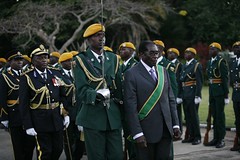
President Robert Mugabe of Zimbabwe with his military forces. The ruling ZANU-PF party negotiated with the opposition to form a national unity government in Harare.
Originally uploaded by Pan-African News Wire File Photos
Emily Johannes
Zimbabwe Herald
ZIMBABWE has taken over the chairmanship of the Sadc defence inspectorate, coincidentally, at a time when member states are celebrating the 30th Anniversary of the transformation of the Frontline States to Sadc and seeking to be Africa’s best region in all aspects.
In the past 30 years, Sadc has transformed from a club of coffee-sipping gentlemen and ladies — (heads of States and Government) to a serious forum for the development, emancipation and defence of the values and virtues of member states.
The major actors have been President Robert Mugabe, Julius Nyerere, Samora Machel, Kenneth Kaunda, Festus Mogae and Thabo Mbeki, among others and the same spirit should be pushed to future generations so that the region’s military prowess gives its people comfort and sleep.
Lucky enough, Sadc still has the likes of President Mugabe to give direction and historical context when trying to put events into context and this is why Zimbabwe is important in the matrix of forming the Sadc military brigade.
Sadc has been able to define critical areas for the development of its people in economic, social and political terms, and has shrugged off manipulation by especially the West as far as the subtle, attempted recolonisation of Zimbabwe is concerned.
In international politics, Sadc’s stance on the Zimbabwean issue was a huge and bold statement in defining the regional bloc’s virtues and values. It could easily be called Sadcism to join a plethora of other -isms.
The latest move by Sadc towards the formation of a standby military brigade will certainly go a long way in fostering regional integration and stability and will ward off outside military interventions that have always been manipulated by powerful western countries.
This should form the heart and soul of Sadc since the political transformation from colonial rule is now complete.
No one in Sadc doubts Zimbabwe’s capability to steer Sadc to greater heights in terms of the standby brigade and guidance as far as the inspectorate is concerned.
Sadc has the required experience and military personnel and has been moving in unison in pooling its resources together and inside information has shown that the inspectorate chaired by Zimbabwe Defence Forces Major General Engelbert Rugeje, has already moved to synchronise the standby brigade into a regional military unit with common understanding.
Coming from various colonial backgrounds and military training, there is no doubt that it is critical for the brigade to have retraining programmes to realign into one force.
There is no doubt that Sadc will ride on the crest of Zimbabwe’s vast military experience and conquest in Mozambique and DRC in which Maj Gen Rugeje fully participated.
While the major thrust has been to economically equip Sadc countries, for a start, to enhance agriculture production so that the region can be self-sufficient to feed its population, there is also need to defend this development through military and political stability.
The threat of Africom, the United States superior military command set specifically to deal with Africa is real and must never be taken lightly by all reasoning Africans.
African leaders can ignore that Americanisation of the continent at their own peril and formations such as the Sadc standby brigade might look small but are the way to go and will in the long run; develop into serious military forces able to contain any situation on the continent. Hence there will be no need to involve Africom.
In future, all that Sadc needs is a military brigade of 50 000 troopers and that should service the region. That will effectively reduce the size of country armies and reduce military expenditure and that should then be a panacea for regional peace and stability.
Eventually, Sadc might not need country armies and just have one force answerable to the Secretariat.
In that vein Sadc, which is more unified than any other African regional grouping, has the advantage of having a few conflict areas or trouble spots and even those are not really as explosive as other conflicts in Africa.
At the moment, the only problem is Madagascar and that is a very small problem that can be easily solved.
The brigade is already underway because all the member states have pledged this and that and are in agreement on what should be done.
Analytically, it is important to protect regional interests politically, socially and militarily because when one goes down to the real issues underlying the activities of a foreign force, at one stage or the other, it becomes difficult to give straight instructions to outsiders.
They have their own interests that might not necessarily remain in tandem with your interests. Therefore, Sadc should continue with its high speed in coming up with the standby force.
Emily Johannes is a South African based political scientist. She can be contacted on ej3333@yahoo.com
No comments:
Post a Comment